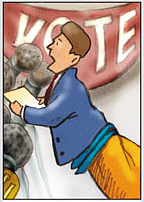
|
|
JUNE 2000 CONTENTS
|
The Whole Truth
By "Guido Veloce"
Illustration by Kevin
O'Mally

About the only thing in high school history classes that much interested me was great oratory: Washington's Farewell Address, anything by Lincoln, Woodrow Wilson's precision, Theodore Roosevelt's passion, Franklin Roosevelt's sense of the right thing to say. Even the dark or unexpected moments fascinated me- -Andrew Jackson's chilling words about the fate of Indians or when a mediocre speaker rose to the occasion, as in Dwight Eisenhower's warnings about the military-industrial complex. No wonder John F. Kennedy's inaugural address so moved those of us who heard it when we were coming of age. No wonder we have been so disappointed with Presidential oratory ever since.
It wasn't disillusioning to learn that some of those stirring words were written by professional speech-writers. I wanted the job. Becoming a presidential speech-writer meant writing immortal, if uncredited, words and sitting at the right hand of power without the messiness of running for office. This was also about the time I heard that power is an aphrodisiac.
So what is a frustrated speech writer to do these days, when much presidential oratory consists of sound-bites and we have two major candidates who, as public speakers, cure sleep disorders? My answer is to try a stunningly novel rhetorical strategy, one that might win over an electorate deeply cynical with politics: speak in a natural manner with absolute candor. That takes a lot of art to do.
Because neither candidate has made an offer I can't refuse, although it is still early in the campaign, I will give a few examples of what a political speech in a new key might sound like. But I'm not auditioning for the job:
"Of course I have to placate special interests. My opponent also has to placate special interests. My special interests are better than his special interests."
"I am not evading questions about my past. Like many of my generation, I cannot remember large parts of my past."
"I don't know where the media come up with phoney issues like campaign finance reform. None of the people I talk to want it."
"Yes, I am where I am because of family connections. So is my opponent. How else do you expect guys who didn't do well in school and who don't have any particular talent to get ahead?"
"I cater to the lunatic fringe of my party. He caters to the lunatic fringe of his party. Pick your lunatics. This is America."
"Gun control is a great idea, but you try it in a nation where even the good guys are armed and dangerous."
"We need to honor and respect the elderly. I just wish they weren't so expensive."
"My administration will represent the rich diversity that makes America culturally vibrant, powerful, and hard to govern. There are more than enough highly-visible token appointments to go around. A lot of them will go to women"
"I will be a strong moral leader. I will go to church as appropriate, mention God without being very specific about who He or She may be, and provide ample opportunities for the public to see my warm, loving, heterosexual, bi-lingual family."
"Don't bother me with issues like gays in the military. Gays have always been in the military. Who were the first guys with earrings, tatoos, and muscle shirts? Sailors. In the words of Dr. Laura, 'get over it.'"
"I never claimed to be a rocket scientist. Being smart doesn't mean being a great president. Look at Woodrow Wilson. He had a PhD from Johns Hopkins and he got us into a war or something."
"You want low taxes or you want lots of goodies?"
"I am against bloated bureaucracies. You are against bloated bureaucracies. Bloated bureaucrats are against bloated bureaucracies. The problem is that we haven't figured out how to run anything without them."
"I have lots of wealthy friends who like my company and tell me many things I wouldn't otherwise know. Would you rather have a President who hangs out at the local convenience store?"
"Cleaning up the environment and ensuring a sustainable future is a very difficult problem, calling for tough choices, international cooperation, and sacrifices by all of us. There are some problems we should just pass on to our children."
"Immigration brings new ideas, new people, and new cuisines to America. It is far better that we import low paying jobs rather than export them. That could change, of course."
"I don't think America has ever had a foreign policy and I don't intend to have one now."
"I don't write this stuff. People do that for me."
"Guido Veloce" is a Johns Hopkins University professor.
RETURN TO JUNE 2000 TABLE OF CONTENTS.